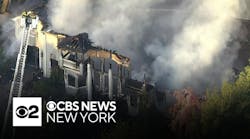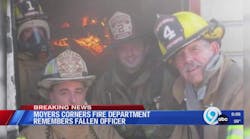The two accidents -- including one deemed the worst in the Mecklenburg EMS agency's history -- have landed the Charlotte area on the radar of national advocates for emergency responder safety.
Those advocates are tracking injuries and calling for changes to better protect workers at wreck scenes, from more training to stiffer legal penalties to studies of what color flashing lights most effectively repel passers-by.
But most of all, responders here and across the country are pleading with drivers to realize just how dangerous their vehicles are to those charged with caring for them in crisis.
"Our job is ... dangerous enough going into burning homes that we shouldn't have to worry about our safety parked on the highways or streets," says Charlotte fire Capt. Rob Brisley.
Paramedic Tim Hayes lost his legs in January when he was pinned against a guardrail at a wreck scene on Interstate 77 in Davidson. A tractor-trailer had slammed into the back of his parked ambulance, sending a nearby sport utility vehicle flying at Hayes. He is recovering at home.
Another paramedic received minor injuries in February on an ice-slick Interstate 277 in Charlotte when a motorist plowed into his stopped ambulance while he was inside.
Authorities called the two accidents frustratingly similar to each other and scores of incidents elsewhere in which emergency workers were maimed or killed.
Nationwide, at least 19 firefighters and paramedics were injured and 13 were killed last year when they were struck by vehicles at emergency scenes, according to Jack Sullivan of Richmond, Va., training director for the volunteer Emergency Responder Safety Institute. The group's membership spans several states.
Sullivan said fatalities at scenes appear to be increasing, though no official database exists. He has kept his own tally for about five years. "The numbers are climbing steadily," he said.
Some suspect that's because more drivers are on the road, and they are more distracted than ever by cell phones, radios and other gadgets. The number of motor vehicle crashes in North Carolina increased 25 percent between 1992 and 1999 alone, one study found. More motorists mean more wrecks, which bring more paramedics into the streets.
"We have near-misses every day," said Eric Morrison, a Medic spokesman. "It's amazing we haven't had anything happen before now."
In recent years, high-profile deaths such as that of Chicago Fire Lt. Scott Gillen in late 2000 have fueled a push for laws with specific penalties for striking or killing an emergency responder. Gillen was pinned against a fire truck when a driver ignored warning flares and lights and spun out of control near a minor highway wreck.
In Illinois, the death of an emergency responder can bring the driver a $10,000 fine and a two-year suspension of driving privileges. Michigan threatens a maximum penalty of 15 years in prison.
In North Carolina, a new law took effect last year ordering motorists to move over when approaching a parked emergency vehicle with its lights flashing, but the rule carries no special penalty. Violating it is considered an infraction that could bring a $100 fine.
The driver who caused Hayes' accident received a ticket for failing to reduce speed. The motorist in the February incident was not cited because slush and sleet caused the vehicle to clip the back of the ambulance.
Some advocates say tougher laws won't fix the problem because enforcement is difficult and penalties only come after an injury or death has occurred. Charlotte fire and Medic spokesmen said the recent accidents have not led them to call for new laws.
"They can rewrite laws related to fire safety, public safety forever, but the human behavior factor of some of these drivers is always going to be a problem," Brisley said.
Yet one paramedic in South Carolina who successfully pushed for steeper fines in his state now wants North Carolina to adopt similar legislation. The recent Charlotte-area accidents are just two more reasons why.
"North Carolina's (law) is a very weak version that was passed to make somebody happy," says James Garcia, 38, of Summerville, S.C. "It wasn't passed to actually protect anybody."
Garcia began his campaign after being injured in 1994 when a van swerving around a minor car wreck hit him and sent him flying 25 feet. What a highway patrolman told him afterwards threw him again: He was at fault for the accident, not the driver who struck him.
That finding prompted him to lobby for new legislation that culminated last year in new fines of $300 to $500 for S.C. motorists who don't steer clear of emergency scenes.
"We're getting whacked, run over, killed all the time here," Garcia says.
Sullivan says harsher laws are only part of the solution. Responders also benefit greatly from better training on how to safely position vehicles at a wreck scene, limit their exposure to traffic, warn approaching drivers and use reflective clothing and lights to become more visible, he says.
"Although it's another tool in our toolbox, what I teach to folks in training is we cannot depend on the laws to protect us on the highway," he says.
Steve Austin, project manager for the Emergency Responder Safety Institute, says his group is also working to get a study of responder safety into the next major federal transportation bill.
He hopes the research will include a look at whether something as simple as changing the color of emergency lights to yellow and positioning them vertically could lead to fewer crashes into emergency vehicles. "We think that's going to go a lot of the way to saving lives," he says.
Republished with permission of The Charlotte Observer. Copyright owned by The Charlotte Observer.





